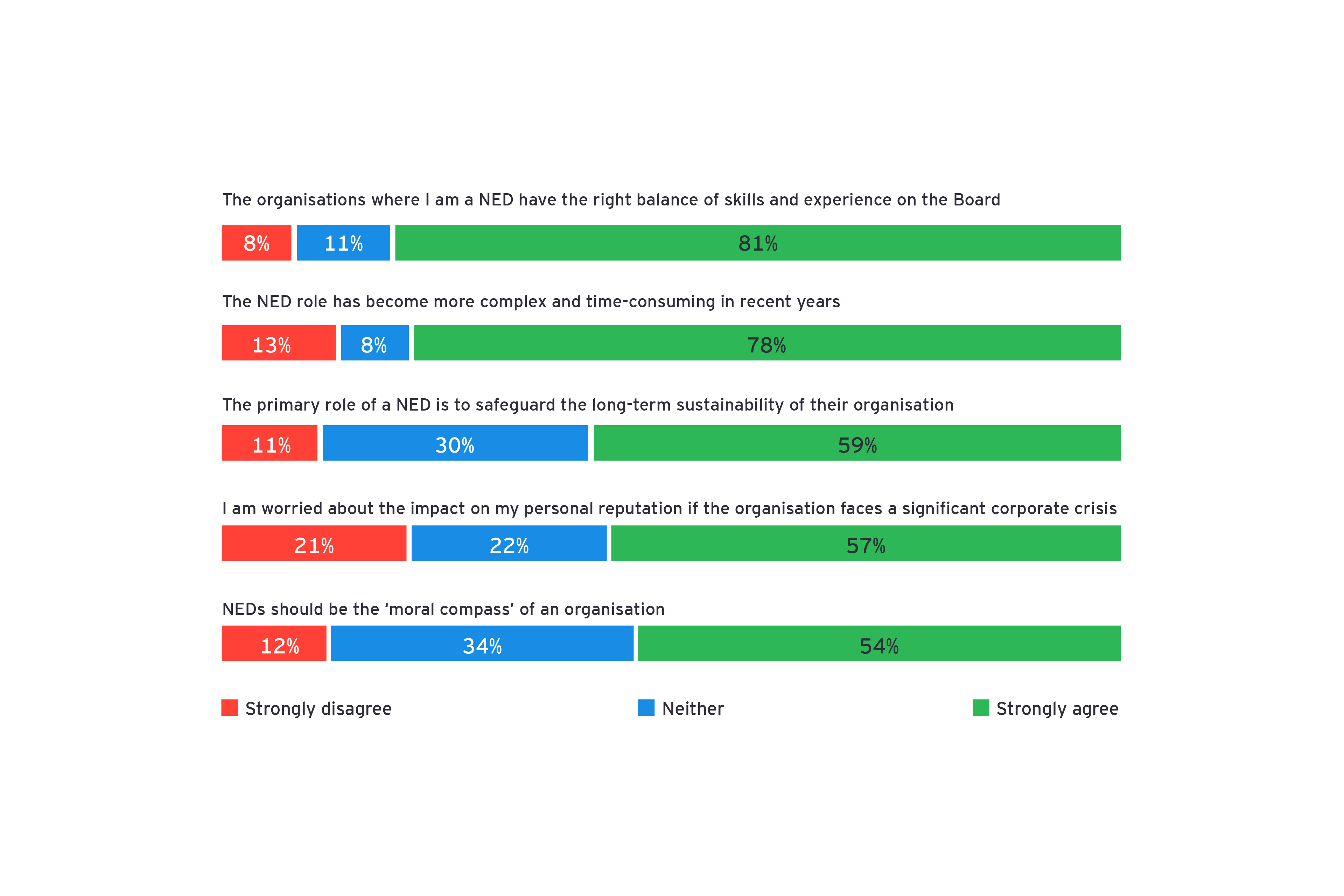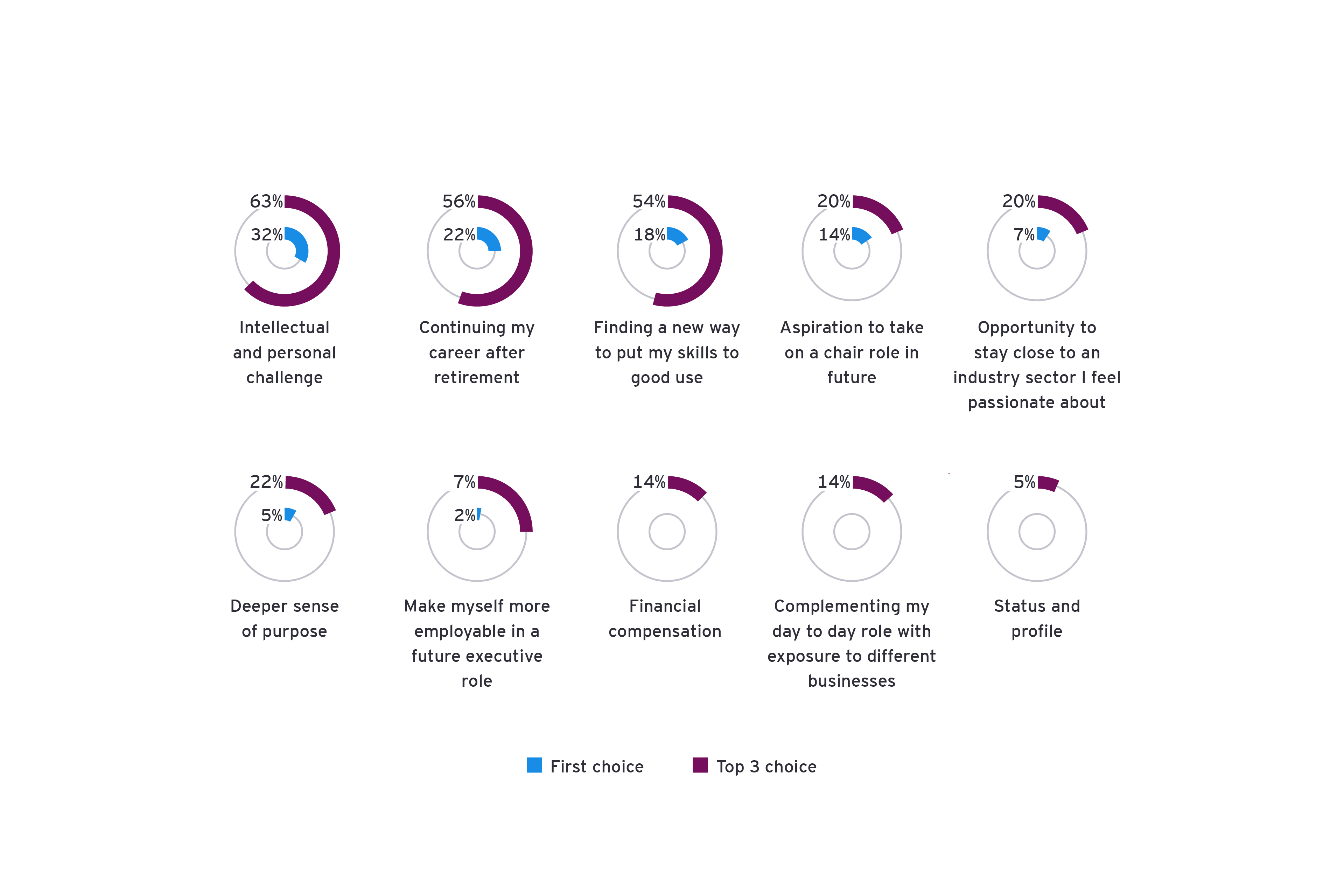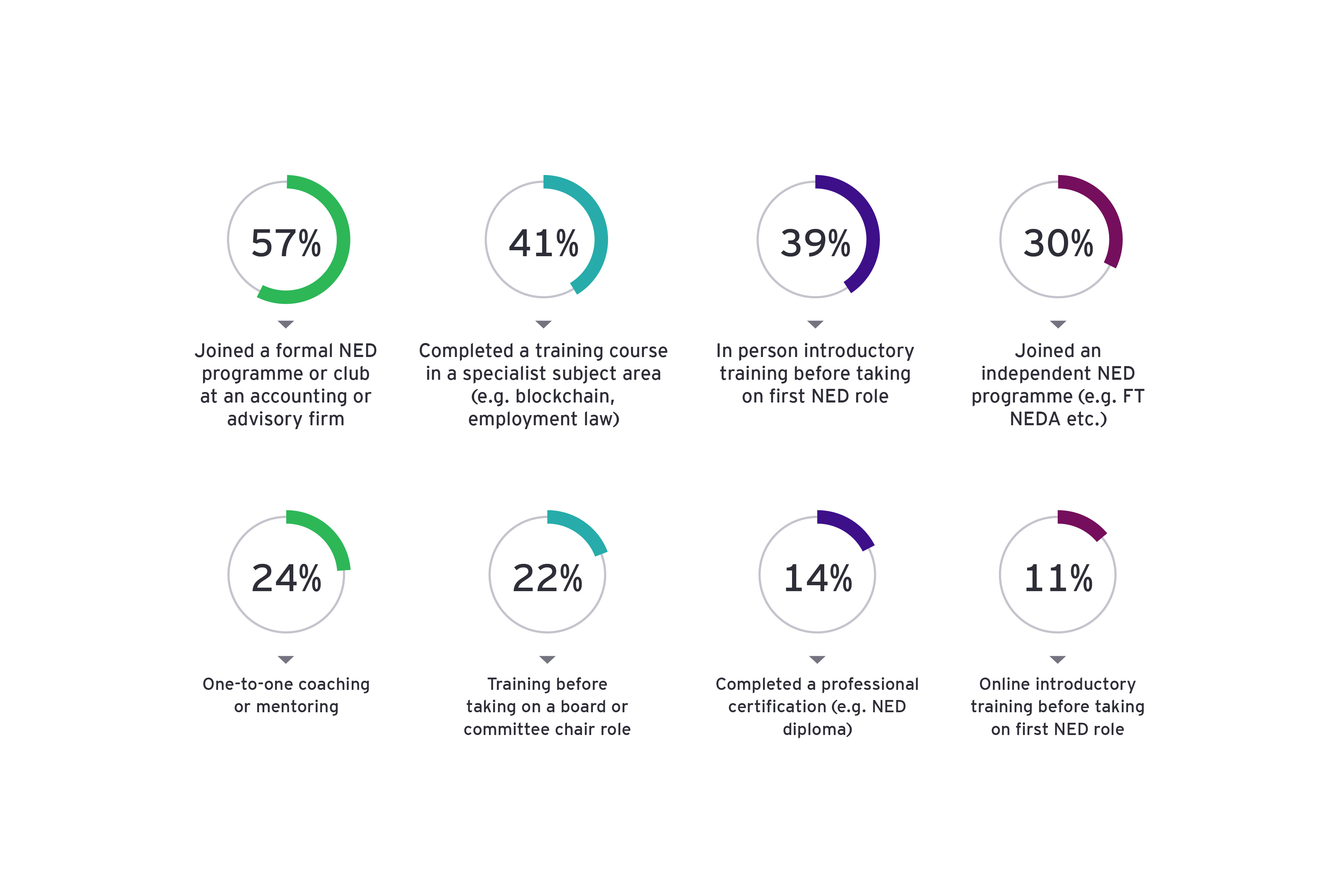
A shifting landscape
The NED agenda for 2020
Digital and cyber take centre stage
Even before the full extent of the COVID-19 pandemic was clear, digital transformation, cybersecurity and changing economic and political impacts were the three big topics on the EY NED Barometer agenda. These are now likely to be even greater areas of focus for NEDs in 2020 and beyond.
Digital & cyber take centre stage
The increasing speed of technological disruption, which has been further accelerated by the COVID-19 pandemic, means that NEDs will need to spend more time focusing on digital transformation in 2020. Yet one interviewee commented that boards struggle to find NEDs with the specialist digital knowledge and skills needed to keep their organisations on the front foot.
While digital transformation offers companies new opportunities to interact with their customers and make better, data-driven business decisions, it also brings with it challenges, most notably the need to keep data and systems secure from ever more sophisticated cyberattacks. Our research reflects the closer scrutiny being paid to how organisations will respond when their cyber vulnerabilities are exposed. One board chair we interviewed explained that NEDs are seeking more active reassurance that their organisations are taking all necessary precautions to keep data safe. This not only requires a much more collaborative process between NEDs and the executive team to ensure understanding, but also a willingness to seek assurance beyond the boardroom. One respondent noted: “NEDs need to ask for external, independent reassurance. What we are seeing is a deeper engagement of the board in this area, not simply being present at discussions and agreeing with the strategy”.
Political and Economic uncertainty
While COVID-19 is likely to be the key priority for some time, other major risks remain. These include uncertainty surrounding the impact of Brexit on trading relationships between the UK and the EU, and the Trump administration’s intention to impose further trade restrictions on foreign governments such as China. All these issues are likely to continue to concern NEDs in 2020 and influence their thinking about future growth opportunities for their organisations.
Sustainability and succession planning
Succession planning for executive roles is a recurring topic that remains important to NEDs at a time of volatility and change. The continued focus on sustainability highlights the growing importance of environmental issues, with one NED interviewee commenting: “Our board is spending much more time on this than was the case previously. I think there is more awareness of the external scrutiny on this issue, and that has to be taken very seriously because if it does go wrong it can be pretty consequential”. With climate-related events such as the Australian bushfires and extreme flooding in the UK capturing news headlines in early 2020, NEDs are likely to need to keep the board focused on environmental and social issues for the next 12 months. NEDs play a powerful role in holding organisations’ leaders to account for how decisions made around the board table impact a wider range of stakeholders. As one NED remarked: “Sustainability and environmental positioning of the business in the broader society is becoming much more important. There is a much greater focus on broader stakeholder value, stakeholder management and what is the position of the business in society.”
Priorities shift for 2020
As already mentioned, COVID-19 is likely to dominate future boardroom discussions as leadership teams deal with the immediate and long-term impacts of the pandemic. In this inaugural barometer we asked NEDs what their priorities were in 2019 so we could compare them to their forward-looking priorities for 2020. Interestingly, NEDs identified organisational purpose and culture as the single most important board topic in 2019, yet it does not register in the top five for 2020. Perhaps this reflects the progress made in 2019 as boards have been spending more time thinking through their organisation’s wider organisational purpose.
Environment, culture, and sustainability have risen up the agenda very quickly. As a NED, you need to think about this from multiple perspectives across the business, because if you don’t, you’re going to get the wrong side of something big time.

Under pressure
A more demanding role for NEDs
NEDs are motivated by taking on new personal challenge. However, NEDs say the demands of the role are becoming more intense.
As previously mentioned, today’s NEDs are expected to make insightful contributions across a wider range of topics and to respond to greater uncertainty within the macroeconomic and geopolitical landscape. They need to be able to do all this while treading a fine governance line, being careful to retain their independence and not straying into the role of operational management. Little wonder, perhaps, that 78% of those surveyed say the NED role has become more complex and time-consuming in recent years.
How are NEDs managing this new reality? Firstly, by being more realistic about the time commitment they can set aside to do the role justice, as one NED explained: “If you are not careful you can find yourself very stretched. People will get told it is 20 or 30 days a year and it is clearly more than that”.
It is not just the length of time NEDs need to build into their schedules — it is also the flexibility to respond to time-sensitive issues and be on hand to accommodate meetings at short notice. One NED said: “If things happen such as a deal or an issue with management then you have got to be flexible and able to respond quickly.” The increasingly virtual nature of meetings during COVID-19 reduces the travel time required by physical meetings but can also increase their frequency and immediacy, making it harder for NEDs to manage and allocate their time.

A moral compass in an ever-changing world
In the decade or so since the financial crisis, the breakdown in trust between business and society has been well documented. Trust has also been at the forefront of customers’ minds as they relied on companies’ products and services during the COVID-19 pandemic. Key to restoring and maintaining trust is the need for businesses to satisfy a wide range of stakeholders that goes beyond financial investors. Expectations have evolved in light of the COVID-19 pandemic as investors increasingly look at how companies are addressing environmental, social and governance (ESG) factors in their operations. As businesses reshape beyond COVID-19, they must also ensure that they remain relevant in the future for all our stakeholders.
As with many of the key corporate challenges of our times, NEDs are at the centre of this, with more than half of those surveyed (54%) agreeing that NEDs should act as a ‘moral compass’ to ensure that their organisation does what is right by its various stakeholder groups, including shareholders, employees and other external partners.
The effect of acting as a ‘moral compass’ is to bind up the organisation’s reputation with the personal reputation of the NEDs on its board. 57% of NEDs we surveyed say they are worried about the impact on their personal reputation if the organisation faces a significant corporate crisis.
Reasons for taking on the NED role
Experienced executives choose to become NEDs for a variety of reasons. The role doesn’t come without its challenges, but it is clearly a rewarding one for many. A third (32%) of NEDs surveyed by EY say their main motivation for doing the role is to take on a fresh intellectual and personal challenge, either as a complement to a current executive leadership role or as part of a portfolio of NED roles to stay busy after retiring from a full-time executive career.
NEDs are motivated by a desire to stay connected in the business world, and to put the skills and experience learned throughout their executive career to good use in a new context. Those who balance a NED role with a full-time position say taking on the additional responsibility gives them a fresh appreciation of board dynamics and new insights into how to be more effective in their day-to-day C-suite role.
One NED, who has a portfolio of non-executive roles in a handful of organisations spanning multiple industry sectors, summed up the risk-reward balance as follows: “The opportunity to get involved in some of the largest global businesses, as a NED both in the UK and overseas, is very rewarding. I don’t see a large risk associated with being on a board if the board does its job properly. As an individual I do my job properly, and I only choose to sit on boards which have very clear governance frameworks in place”.
What has been your motivation for taking on a NED role? In order of importance, please rank the top three factors.


Facing the future
Long-term thinking puts NEDs centre stage
NEDs have a crucial role to play in promoting long-term value creation and to think beyond the quarterly reporting cycle.
Even before the full impact of COVID-19 was known, many businesses were reconsidering the balance between short and long-term imperatives. The drivers are multiple, from the growing demands of activist investors to the need to restore public trust in business, but one thing is certain — NEDs are on the front line of this shift.This is firmly reflected by our survey, with 59% agreeing that the primary role of a NED is to safeguard the long-term sustainability of their organisation. This is because NEDs have a crucial role to play in promoting long-term value creation and to think beyond the quarterly reporting cycle.
In practical terms, NEDs tell us that they plan to devote more of their time and attention to thinking through how their organisation can respond to the long-term trends disrupting their industry. This means having a clear view of where the business needs to be in five to ten years’ time and what changes need to be put in place today to be better equipped for the future. According to one interviewee, NEDs need to have their finger on the pulse of how changing customer behaviour will impact the future business model.
Yet, as is often the case when trying to focus on the long term, short-term demands can get in the way. Quarterly reporting requirements and increased governance pressures mean that space for long-term thinking can often be crowded out, with the outcomes of the Brydon, Druckman and Kingman reviews likely to add to the intensity of the problem. One of the NEDs typifies the view that this needs to be rebalanced: “The advent of governance upon governance is undoubtedly limiting the time available to sensibly have a discussion on the future of the business”.
To address this, many of the NEDs we spoke to say they are encouraging their boards to actively seek external perspectives. Non-executive chairs are carving out space on the board agenda to invite experts in to provide training or to present on developments in a specific area and its implication for future strategy. According to one chair the demand for this kind of input is likely to increase: “Boards want to hear more external perspectives. They want to bring in new ideas and to provoke broader thinking. I think getting this type of input from advisors will be an increasing theme as we go forwards”.
How do you measure the value of long-term thinking? EY has been working with the Embankment Project for Inclusive Capitalism to develop a reporting framework that helps demonstrate long-term value and clarifies value creation for all stakeholders. Find out more

Providing better challenge
New skills and fresh perspectives
Successful NEDs can’t know about everything, but they should make sure that they are able to contribute in some way to all the key agenda items.
As technological and market change accelerates so does the need for specialist insight and fresh thinking.
An increasingly demanding skill set
As their roles become more demanding, NEDs are increasingly focusing on the skills and capabilities that they require in order to meet the challenges ahead. Many of our respondents talked of the need to offer a constructive challenge to the executive team: “You have to be prepared to ask questions that might not be comfortable to ask, but do it in a way that brings your board colleagues and the executives with you”.
Have you done any of the following to enhance your knowledge and skills in relation to your NED role?

NEDs are proactively seeking a range of learning and development opportunities to enhance their knowledge and personal effectiveness.
This ability to ask better questions clearly requires not only a good understanding of all the issues impacting the organisation, but also the soft skills needed to engage successfully with fellow executives. While boards already do much to support incoming NEDs, such as structured inductions programmes led by the board chair, our research reveals that NEDs frequently and proactively seek out opportunities to expand their own learning and development. For example, 41% of NEDs say they have completed a training course in a specialist subject area since taking on a NED role.
Alongside seeking out regular training and development opportunities, a majority of NEDs (57%) say they have joined a formal NED programme run by an advisory firm, such as EY’s Centre for Board Matters. Others have joined one of the independent programmes on offer run by organisations such as the Non-Executive Directors’ Association or the Financial Times. Structured NED programmes provide not only the opportunity to network and learn from peers, but also provide regular exposure to leading industry thinking and access to market opinion formers and respected commentators. Other ways to plug gaps in their knowledge include coaching or mentoring and professional certification (adopted by 24% and 14% of NEDs in our survey respectively).
Whatever the approach taken to filling gaps in their knowledge, NEDs are clear that they are looking for opportunities that will provide new angles on topics and give them fresh perspectives on the questions to ask in the boardroom.
The need for fresh perspectives
NEDs already play a vital role in bringing fresh thinking and experiences into the boardroom and in challenging perceived wisdom but, as technological and market change accelerates even more rapidly due to COVID-19, there is a need for fresh and more diverse thinking.
In some instances, this can be achieved by inviting people with experiences across different industry sectors and multiple boards to take on non-executive roles within a new sector. One of the senior NEDs agrees: “I am a big supporter of being on a number of boards for this reason: you get to see things from multiple perspectives”.
In order to further broaden their perspective, some boards are now actively targeting younger NEDs or those who come from a wider variety of backgrounds with more specialist knowledge. One interviewee with nearly two decades of experience in NED roles explains how the composition of boards has changed significantly throughout her time in post: “Today I see more people getting involved on boards at a younger age. I think that is a very good development. People are now being actively recruited for boards who are IT and systems literate or who have a lot of experience with the customer and customer experience. They know the right questions to ask of the executive team to address these new organisational priorities”.
EY also spoke with several up-and-coming NEDs who believe that more needs to be done to cultivate participation from a younger cohort of NEDs. One way of addressing this experience gap is through initiating a shadow board. These boards comprising younger members with a more diverse range of backgrounds. They receive and discuss the same board papers as the organisation’s main executive board and are asked to come up with creative solutions to the strategic challenges facing the organisation. This can be an effective channel to capture fresh thinking without adding lots of new seats around the board table and provides a helpful steppingstone for early career professionals to take on a quasi-NED role.
Of course, the need to broaden perspectives and reflect society more closely goes well beyond more youthful cohorts. Gender and ethnic diversity remain major challenges for boards, with the latest Hampton-Alexander review into female board representation and the Parker Review on ethnic board representation both being published recently. We expect this to become an increasingly important topic for boards in 2020 and beyond.
Megatrend 2020 and beyond
Are you reframing your future or is the future reframing you?
The COVID-19 pandemic is fundamentally changing the way the world works. This global reset has created an opening for change and an opportunity to shape the post-pandemic world for the better. EY Megatrends 2020 provides business leaders with a framework for navigating unprecedented change and charting future growth. Formulating strategy on how the future will be reframed will determine which companies use the pandemic to foster a renaissance, and which risk irrelevance.
Summary
Our in-depth survey of FTSE non-executive directors (NEDs) reveals that their role is becoming increasingly demanding, with digital transformation, data, cyber security and sustainability key areas of focus.
These demands are likely to intensify as boards look beyond COVID-19, reshaping their business to address societal shifts and plan for economic recovery. With their wealth of experience, NEDs will be at the heart of vital discussions on future purpose, competitive advantage, resilience and long-term value.
Our inaugural NED Barometer is designed to help boards maximise the value of NEDs’ collective wisdom – and find answers to the crucial questions that organisations face.


